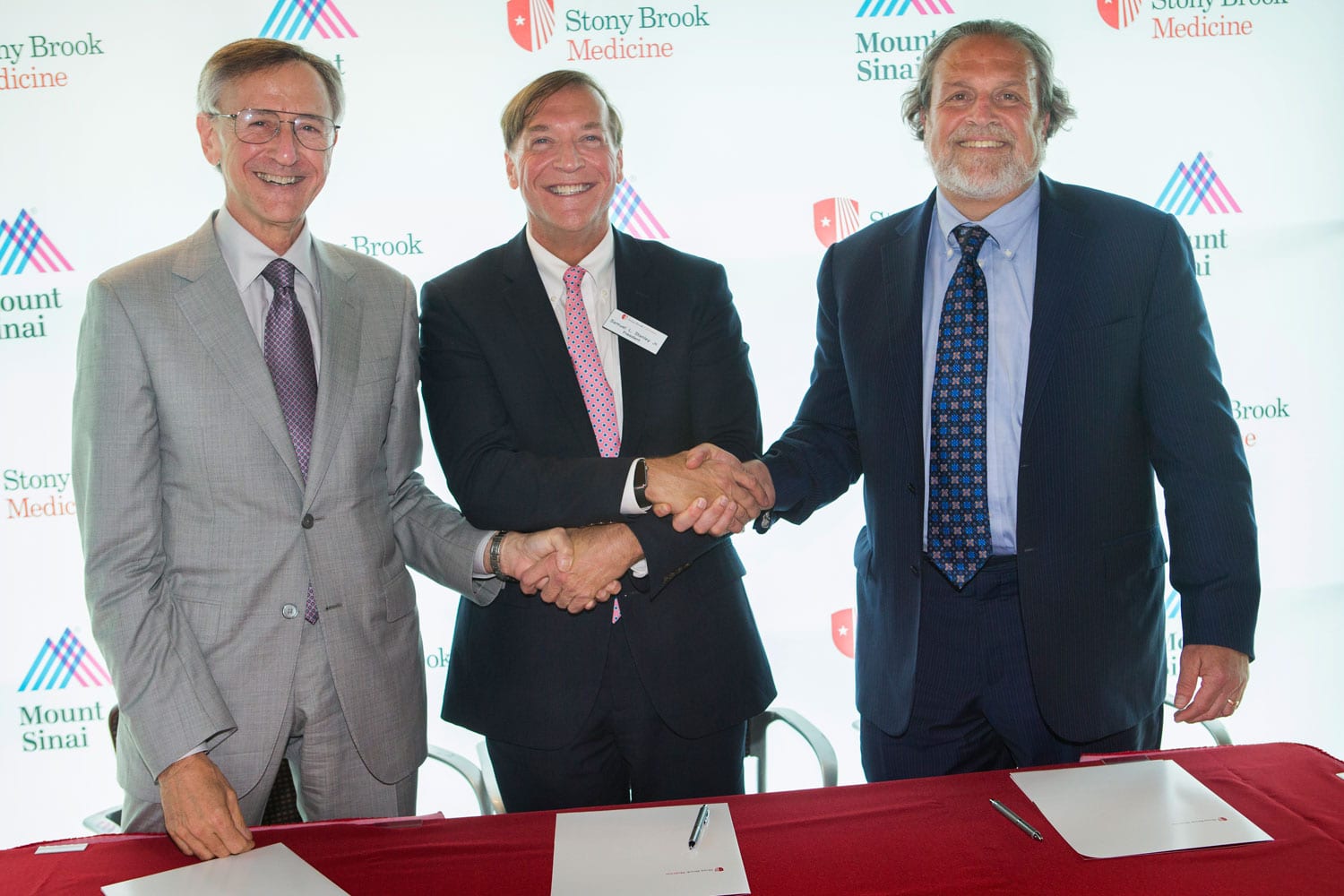By Talia Amorosano
Two major medical institutions have agreed to team up, and the partnership could lead to big scientific breakthroughs.
In order to create more academic research opportunities and streamline and expand clinical care initiatives, Stony Brook Medicine and Mount Sinai Health System, in New York City, have entered into a comprehensive affiliation agreement. The change will promote inter-institution collaboration encompassing all five of Stony Brook’s Health Science schools, Stony Brook University Hospital, all 25 academic departments of the Stony Brook University School of Medicine, Mount Sinai Health System facilities and Medical School, and the Icahn School of Medicine at Mount Sinai inclusive of seven hospitals and an expanding ambulatory network.
Facilitators of the partnership believe that the expansion of clinical trials and research opportunities for both institutions will prompt research and studies that could lead to major discoveries, especially in the treatment and understanding of disease.
Dr. Kenneth Kaushansky, senior vice president for Health Sciences at Stony Brook University, noted that the alliance will make use of the strengths of each individual institution.
“What we both get out of the affiliation is enhanced possibilities for science and education,” he said. “Multiple groups of investigators [with members from each institution] work together and look at things in slightly different ways.”
In a press release, he noted Mount Sinai’s Icahn School of Medicine for its strong biomedical, clinical research and health policy expertise and Stony Brook University for its advanced mathematics, high-performance computing, and physical and chemical science departments to illustrate the point that these institutions can accomplish collaboratively more than each can do alone.
“In the long term were gonna roll out more and more in the way of clinical interactions,” said Kaushansky, who mentioned Stony Brook’s recent recruitment of two new cardiac surgeons from Mount Sinai. “We don’t do heart transplants, but Mount Sinai does.”
He emphasized the new potential for patients to easily seek services from either hospital. In fact, joint research programs ranging from fields of biomedical engineering and computer science to medicinal chemistry science, neurology, psychiatry, therapeutics and more are currently in the works.
“Stony Brook Medicine and the Icahn School of Medicine at Mount Sinai are two powerhouses of research that when partnered will definitely yield more than just the sum of their parts.”
—Lina Obeid
In terms of education, University students will now be afforded the unique opportunity to take classes offered on either or both campuses, and participate in a variety of summer programs geared toward students of all ages. The two schools plan to facilitate joint graduate and medical educational programs in a wider range of subjects than ever before, and have agreed to invest a collaborative $500,000 for the development of academically challenging pilot programs to be supervised by a joint committee.
“The joint pilots in research have immense promise to advance health at the most exciting time in the biomedical sciences, including advanced computational, bioinformatic and engineering approaches,” said Lina Obeid, MD, dean for research and vice dean for scientific affairs at Stony Brook University School of Medicine. “Stony Brook Medicine and the Icahn School of Medicine at Mount Sinai are two powerhouses of research that when partnered will definitely yield more than just the sum of their parts.”
Other leaders of each institution have already expressed similar enthusiasm about the affiliation, which was effective immediately upon signing, and many have verbalized hopes that groundbreaking research will take place as a result of this strategic partnership.
Dr. Kenneth L. Davis, president and chief executive officer of the Mount Sinai Health System, said, “Together [Mount Sinai and Stony Brook] will use our outstanding resources to create changes in medicine.”
“Each institution has so much to offer,” said Stony Brook University President Samuel L. Stanley Jr., “this is an opportunity that will prove to be beneficial to all — now and in the future — as we explore and grow this incredible collaboration.”
Looking toward the future, Kaushansky said that Stony Brook has more affiliation agreements in the works, contingent upon state approval.
“We are working very hard with our friends in the state of New York to get approval for affiliation with Southampton Hospital and Eastern Long Island Hospital in Greenport,” he said.
Also pending is a potential partnership with John T. Mather Memorial Hospital in Port Jefferson. “In April, Mather Hospital asked a number of healthcare systems — us included — whether they were interested in affiliating with Mather Hospital, and we said yes,” Kaushansky said. “We made a proposal to the Mather hospital board … and they were supposed to decide [with whom they wish to affiliate] back in June.”
About a year ago, Kaushansky said he wondered aloud how it is that the insistution could make a bigger impact on clinical medicine, education and research. He now expresses confidence that Stony Brook’s affiliation with large city medical center, Mount Sinai, and future mutually-beneficial partnerships with Long Island hospitals and medical centers, is the most surefire way to achieve such an impact.







